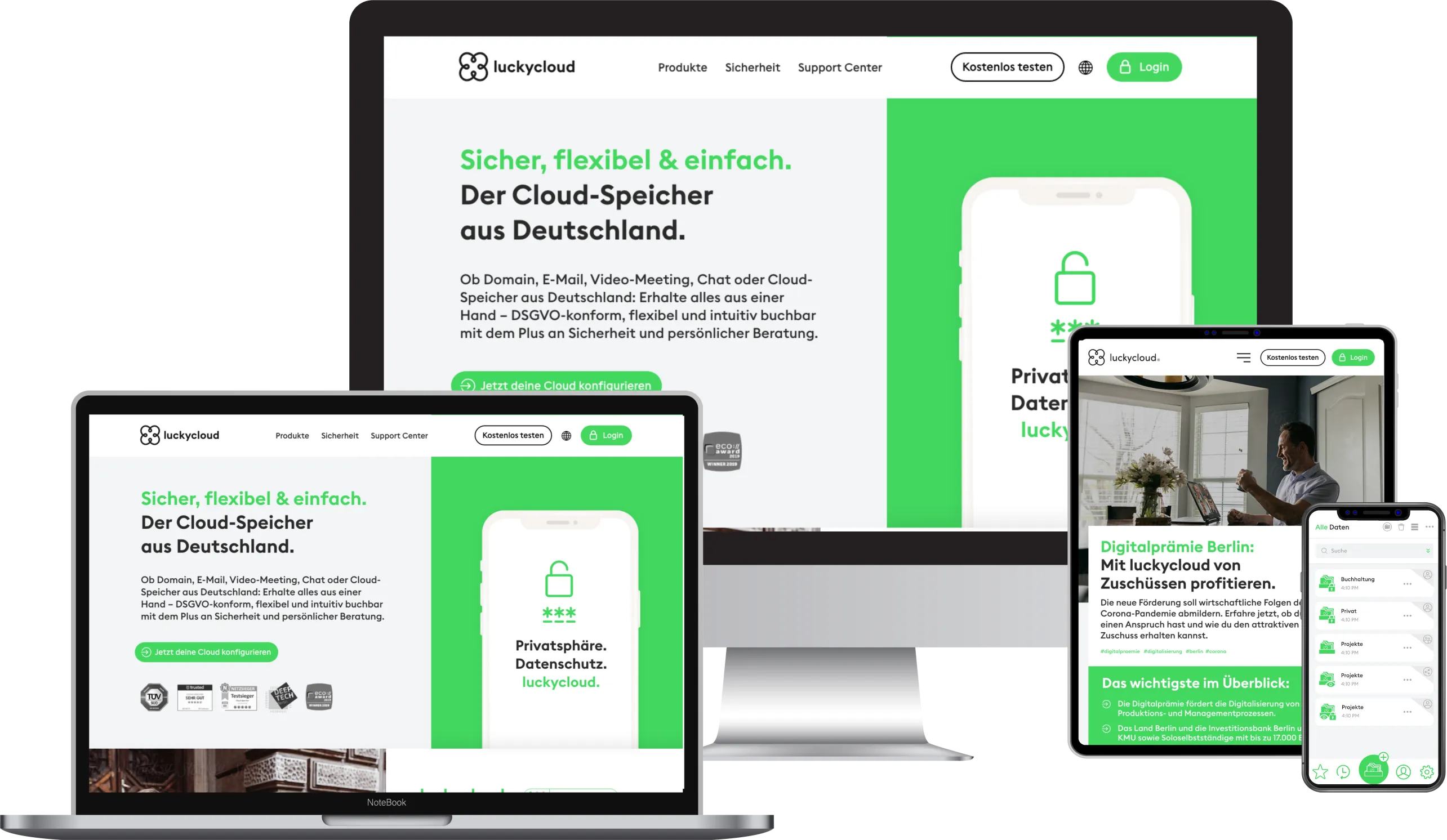Remote nowBooking an appointment
Summary





Find the right strategy for more IT security in your company: This hybrid cloud model fits you
Huge volumes of data, employees in home offices, and collaboration across several countries and continents: The importance of a well thought-out digitization strategy for companies was not only demonstrated during the Corona pandemic. Those who rely on a scalable, secure and efficient IT infrastructure create an important basis for future corporate success. A cloud solution is now indispensable for this. It is particularly efficient and secure in combination with network storage.
Dreamteam Public Cloud and Network Storage
A hybrid cloud is suitable for all industries and company sizes that deal with digital data and processes. It provides flexibility, scalability and special security for the data. The combination of public cloud and network attached storage (NAS) is ideal for companies. NAS servers can be used as a private cloud and integrated into your company's private network. The content of the NAS server is then mirrored in the public cloud as a backup.
This way, identical data is available to your employees at all times: In the office, they access the NAS server directly; when working remotely from the home office, they access the public cloud. This eliminates the need for VPN access and enables faster loading times. NAS servers come in different dimensions and can be easily expanded with additional storage.
Delta Synch for even more speed
.A NAS-hybrid-cloud combination with delta synch technology, i.e. an algorithm for performing incremental backups, is particularly efficient. This means that during automatic synchronization between NAS and cloud, the complete data sets are not copied, resulting in large data volumes. Instead, Delta Synch breaks down the files into data snippets and only reloads those individual parts that have been changed. The effects on efficiency, storage capacity and transfer speed are immense, especially with large data volumes. Another advantage is that if the backup is interrupted due to an error, restoring the data is much easier. This saves time, energy and money.
These are the advantages of the hybrid cloud at a glance:
- Keep full control over data .
- Fully comply with data protection regulations .
- Optimize data security
- Respond flexibly to current situations
- Continue to use demanding applications
- Create space in the enterprise
- Test out new applications
- Evaluate Big Data
- Avoid process redundancies
- Push forward with digitization
Which hybrid cloud model is right for your IT security strategy?
Infrastructure as a Service (IaaS)
The cloud service provider manages the hardware. The company rents computer infrastructure. This can be populated with the company's own cloud applications and used remotely.
- Your IT team can access resources as needed via an API or dashboard .
- Low cost
- Control and flexibility
- Your IT team manages operating systems, databases, applications, functions, and all of your organization's data itself .
Platform as a Service (PaaS)
A cloud environment where users can develop applications on the Internet. In addition, there are other options for feature development. Here, the cloud service provider also provides the operating system and databases.
- Less work for your IT team: your organization is still responsible for applications, features and data in the process.
- Flexibility
- Streamline workflows and improve coordination .
- PaaS provides developers with a simple, scalable platform for application development .
Software as a Service (SaaS)
The company subscribes to usage licenses for a software instead of buying it. Software is installed on the provider's servers.
- The model provides the most support and is the easiest deployment method for enterprises.
- Flexibility and scalability .
- Rarely requires in-house IT resources .
Conclusion
Efficiency, flexibility and scalability of a public cloud combined with security, data protection compliance and trustworthiness of a private cloud: the hybrid cloud combines the advantages of different worlds. In the process, companies can save costs for maintenance, personnel and energy (data center). IT administrators are relieved and can devote themselves to more lucrative tasks. In addition, there is increased data security and more efficient work, higher service quality, and greater customer satisfaction and loyalty. The decision for a hybrid cloud model depends on your available infrastructure, IT staff resources, cost factors and cloud security requirements.
Find the right strategy for your IT security now, we'll be happy to advise you!
You might also be interested in

Measures Taken of a Critical Vulnerability in the Java Library Log4j
With this blog post we would like to inform you about measures we have taken regarding a critical security vulnerability in the Java library Log4j. We have already taken all recommended measures a...
Updated: 07.06.2023
Learn more
Find the right strategy for more IT security in your company: This hybrid cloud model fits you
The right combination is often unbeatable: Those who efficiently cross a public and private cloud create a powerful system. The resulting hybrid cloud has proven to be the ideal solution for many u...
Updated: 08.06.2023
Learn more
Measures Taken of a Critical Vulnerability in the Java Library Log4j
With this blog post we would like to inform you about measures we have taken regarding a critical security vulnerability in the Java library Log4j. We have already taken all recommended measures a...
Updated: 07.06.2023
Learn more
Find the right strategy for more IT security in your company: This hybrid cloud model fits you
The right combination is often unbeatable: Those who efficiently cross a public and private cloud create a powerful system. The resulting hybrid cloud has proven to be the ideal solution for many u...
Updated: 08.06.2023
Learn more
Measures Taken of a Critical Vulnerability in the Java Library Log4j
With this blog post we would like to inform you about measures we have taken regarding a critical security vulnerability in the Java library Log4j. We have already taken all recommended measures a...
Updated: 07.06.2023
Learn more
Find the right strategy for more IT security in your company: This hybrid cloud model fits you
The right combination is often unbeatable: Those who efficiently cross a public and private cloud create a powerful system. The resulting hybrid cloud has proven to be the ideal solution for many u...
Updated: 08.06.2023
Learn more
Measures Taken of a Critical Vulnerability in the Java Library Log4j
With this blog post we would like to inform you about measures we have taken regarding a critical security vulnerability in the Java library Log4j. We have already taken all recommended measures a...
Updated: 07.06.2023
Learn more
Find the right strategy for more IT security in your company: This hybrid cloud model fits you
The right combination is often unbeatable: Those who efficiently cross a public and private cloud create a powerful system. The resulting hybrid cloud has proven to be the ideal solution for many u...
Updated: 08.06.2023
Learn more



























